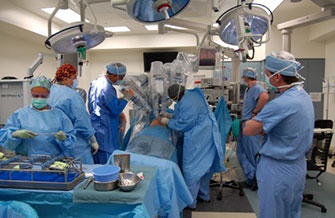
Why choose the HonorHealth general surgery residency program?
The HonorHealth General Surgery Residency Program stands out for several compelling reasons that make it an excellent choice for aspiring surgeons. Here's a breakdown of its key strengths:
Comprehensive and rigorous training

- Strong academic curriculum: Residents benefit from a well-structured educational framework that includes protected education time; weekly didactic lectures and Morbidity & Mortality meetings, bi-weekly Research meetings and monthly Grand Rounds, Journal Club, and Trauma Process Improvement Committee meetings.
- Hands-on surgical experience: From inter- year onward, residents receive instruction in surgical techniques, including laparoscopic fundamentals and simulation training.
Diverse and experienced faculty
- Full-time surgical specialists: Residents train alongside experts in General Surgery, Bariatric/MIS, Breast, Cardiothoracic, Colorectal, Complex/Advanced GI, Critical Care, Endocrine, Hepatobiliary, Surgical Oncology, Trauma, Vascular and Wound.
Robust clinical exposure
- Trauma and ICU rotations: Up to nine months per year in general surgery/trauma/ICU during the first four years.
- Chief year autonomy: Chief residents lead their own service under the guidance of the Program Director or site directors.
- Level 1 trauma centers: There are three Level 1 Trauma centers located within HonorHealth’s multiple facilities, offering exposure to emergency procedures and critical care.
Advanced technology and simulation
- Robotic surgery curriculum: Starts in the first year, culminating in certification.
- Endoscopy and bariatric surgery: Active programs ensure residents are well-versed in modern surgical techniques.
- Simulation labs: Includes laparoscopic, bronchoscopy, and colonoscopy simulators, plus access to FES labs for certification prep.
Diverse training sites
- HonorHealth medical centers: Serve varied patient populations.
- Partner institutions: Includes Valleywise Health (Burn), Phoenix Children’s Hospital (Pediatric Surgery), and Mayo Clinic Arizona (Transplant Surgery).
Supportive and collaborative environment
- Collegial culture: Emphasizes teamwork among faculty, residents, nursing, and staff.
- Housestaff Leadership Council: Encourages inter-residency/fellowship networking and collaboration across multiple specialties.